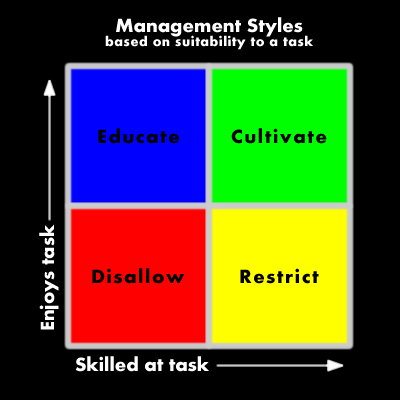
Cultivate: A manager should do this for a person that both likes the task and is good at it. Not only does this mean that you have a great choice of who should be assigned the task, if you are a manager of this person, you should be looking for opportunities to leverage his skills to do more of this and related work. In conjunction with his individual contribution, you should also be looking for ways he can supply leadership to others, assuming of course that he isn’t someone who shies away from leadership entirely. I think that latter case is fairly rare, as leadership doesn’t have to mean management or public speaking, but can take many forms.
Educate: This is what you do for a person that likes the task but does not yet have competency. I used “educate” rather than “train” because education can be more than just training. Education should include training; apprenticeship, where the person works with a more skilled coworker to learn the skills; guidance, where the manager or a mentor helps him figure out what he needs to do to improve; and opportunity, where he is given a chance to work his skills on the task, but probably off the critical path. The most important thing is to recognize this is where growth happens. An employee not doing anything that falls into this category is going to get bored, frustrated, or angry, depending on temperament and what other categories apply, and will either leave or stay on with negative impact on the larger team.
Restrict: Sometimes, a person is good at a task, but doesn’t like to do it. This is the most dangerous situation with regards to destroying a good manager/employee relationship because it’s easy for the manager to give the person the task and keep him on it. If at all possible, you shouldn’t ask him to do this work. If you do, though, it’s important to do several things: make it clear it’s temporary; explain the need; take immediate and visible steps to relieve him of the work; and find a way to deliver additional rewards for the work. Don’t think that the extra rewards will carry you along indefinitely, though. If he doesn’t like the work, you won’t be able to pay him enough to keep him at it for very long.
Disallow: For the person who doesn’t like a task and isn’t any good at it anyway, I was really thinking “avoid,” but the word isn’t strong enough. This one sounds obvious when you read it here, but managers assign work to people who don’t like it and aren’t good at it all the time. If you think your employee will grow to like it as he gains skill, think again. Not only will he hate the work, he’ll feel humiliated by his failures, disinterested in the improvement, and resentful of the assignment. If he was going to get better at it, he’d have expressed an interest. If you don’t have anyone else to do this work, then figure out how to get by without it until you have someone who can. If you decide it just can’t wait, then you have a problem on the order of figuring out which employee (or at least which employee relationship) you’re going to sacrifice to get the work done. Put in such terms, it’s likely you’ll reconsider the importance of the work one more time.
A matrix of tasks and the suitability levels for the employee assigned to each provides a pretty clear roadmap about how your employees’ careers can be directed for maximum success.